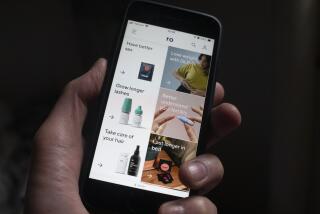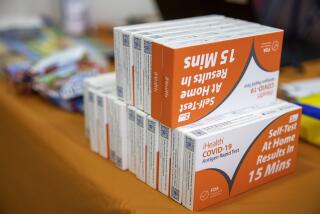Skip the Doctor on the Way to the Lab
- Share via
Getting a “simple” blood test can seem about as simple as getting a mortgage approved. There’s the 20-minute schlep (minimum) to the doctor’s office and back; the long purgatory of the waiting room; then the hour or so shuttling among doctors, nurses and medical technicians, only to learn--after half the day is blown--that the results won’t be ready for a week or more, sometimes requiring another appointment.
To which many Americans now say: Forget it. Commercial testing labs and Internet brokers have begun to bypass doctors, selling medical tests straight to consumers. So-called direct-access testing has a drive-through appeal: Roll up a sleeve, slap down a credit card or cash, and choose from a menu of 30 to 50 tests. The results are often available the next day, on the Web; no doctor’s order is required, and no insurer is involved.
“Time and convenience are quality-of-life issues for me,” said Jeannette Leach, 49, a research scientist in Boulder, Colo., who has ordered tests to help monitor her thyroid condition. “The lab I visit is located on one of the roads I use to drive to work. It opens at 8 a.m., and at 8:01 I’m there, and 10 minutes later I’m on my way to work.”
“The number of people doing this right now is very small, we think,” said Dr. Bruce Friedman, a professor of pathology at the University of Michigan School of Medicine, “but it should have enormous appeal to the sort of health-conscious consumers who are most enthusiastic about exercising control over their own health care.”
Limited health assessments, such as stroke screenings and blood-pressure checks, are increasingly being offered at pharmacies and grocery stores, and full-body X-ray scans have proved so popular that they’re now available at some malls. Most recently, the world’s largest diagnostic lab, Quest Diagnostics Inc., opened direct-testing locations in Colorado, Kansas, Missouri, Maryland and Virginia and has partnered with Giant Food, an East Coast grocery chain, to sell a range of blood and other tests in stores.
So far, direct testing appears to be growing most on the Internet. Demand has not been strong at walk-in outlets, said Jondavid Klipp, managing editor of Laboratory Industry Report, who has surveyed some of the labs. Quest would not disclose the number of tests it has done. Yet Web-based outfits have seen increased sales in the first half of this year. HealthcheckUSA of San Antonio reports doing several thousand tests this year, a 200% increase in sales since January 2001. Online outfits contract with local labs to collect blood or other samples, then have the fluids shipped out of state for testing.
*
Web Sites Skirt Laws
Although many states, including California, have laws prohibiting labs from performing most tests without a doctor’s authorization, direct-to-consumer Web sites aren’t subject to such laws if their labs are located outside those states.
“What’s happening is that many clinical lab functions are going onto the Web, and they are increasingly available to consumers, no matter where they live,” said Friedman. Once the companies have invested in the cost of developing a Web presence, researchers say, it’s inevitable that they will continue to expand the range of tests they offer, from simple blood tests to urinalysis and ultrasound imaging for osteoporosis.
In recent years, several state legislatures--including California’s--have moved to expand the number and type of tests available without a doctor’s order. Last year Gov. Gray Davis signed a bill allowing labs to perform without a doctor’s authorization any test currently available as an at-home kit, including pregnancy, cholesterol and glucose screenings.
According to Friedman, who has studied the emergence of the e-laboratory, direct testing has two principal attractions: easy access and privacy. Health-conscious people who want tests more frequently than their doctors order are one category of users. So are people who want to check their blood and urine before submitting to a drug test. The list also includes people who want to test themselves for HIV or hepatitis C anonymously, or who want to peek at certain values--such as cholesterol levels--in private, before shopping for health insurance or changing plans.
The most popular tests are standard blood panels, which include anywhere from 12 to 20 different measures, from cholesterol and glucose levels to markers of liver and kidney function. These panels are often ordered as part of routine physical exams, but the demand for them suggests another category of user: affluent and busy people who want to have a peek at their test scores without going to visit a physician.
As a rule, direct-access testing labs strongly advise their customers to consult with a doctor. “We have been very clear that this testing is no substitute for seeing a doctor,” said Hughes Bakewell, vice president of consumer health at Quest. “We see our service as a complement to regular doctor visits.”
Leach, who has had a standard panel of about 20 blood tests through HealthcheckUSA, including measures of thyroid function, said that’s the way she has used the results. “As soon as I get them, a copy goes to my primary-care physician and my endocrinologist, who treats my thyroid condition,” she said.
Yet there’s no guarantee that most direct-access customers will consult a professional, and that’s the problem, doctors say. “The first rule of medicine is: Do no harm,” said Dr. Linda Rosenstock, dean of the UCLA School of Public Health, “and here we have a situation where people may be getting false assurances about their health and not making follow-up appointments when they should be, or becoming very anxious about a test result when there’s no need to be.”
The PSA screening for prostate cancer in men is a good example. Doctors consider PSA readings below 4 to be normal, between 4 and 10 to be slightly elevated, and above 10 to be strong evidence of cancer. But at least half of the men who score above 4 don’t have the cancer, and around 20% of those who have normal scores do develop cancer. In many cases the best way to use the test, many doctors believe, is to track the change in its value over time--not to relax or panic based on a single result.
For that matter, not everyone understands what a “normal” result is. According to Dr. Carolyn Clancy, acting director of the U.S. Agency for Healthcare Research and Quality, which researches health care quality and patient safety, a normal test score is one that falls within the range where 95% of healthy people score. The other 5% are perfectly healthy people whose levels are naturally higher or lower than this range.
“For that type of person, the result they get is not abnormal at all for them, but they have no way to know that,” said Clancy. “I would be concerned about anyone who had one of these results and was waiting for a doctor to return a call. They could be waiting as much as a week, and the whole time they’re trying to figure out if they need to make a will, or what.”
*
Tests Present a Puzzle
Some of the most popular tests available by direct access are widely accepted as authoritative evidence of underlying disease: cholesterol for heart disease risk; glucose levels for diabetes risk; and markers for liver and kidney function. Other tests often present people with a difficult puzzle, however.
For example, labs often check levels of homocysteine, an amino acid associated with increased risk of cardiovascular disease. Unfortunately, said Clancy, no one knows exactly what to do about those levels, or how much difference it makes to reduce them. “If we found out that redheaded people were more likely get heart disease, well, what could we do about it?” she said.
That’s why public-health researchers believe that direct testing is perhaps best reserved for people who understand the limits of lab work. Not only can “abnormal” results be wrong, in which case they should be repeated, they say, but many tests are crude and should be treated that way. One example is the CA-125 test to screen for ovarian cancer. “This is a test that many women ask for, and we tell them it’s not very sensitive,” said Vaughan. “They need to know that before seeing results.”
No medical association recommends CA-125 screening, and for good reason, said Dr. David Atkins, staff director of U.S. Preventive Services Task Force, an independent panel that evaluates screening procedures. For one thing, standards for evaluating CA-125 levels may vary from lab to lab. For another, the false-alarm rate is very high. In a recent study among more than 10,000 women age 45 and older, English researchers found that 468 had elevated CA-125 levels. Further testing identified 29 who appeared to be good candidates for surgery, but it turned out that only six of those who had surgery actually had the cancer.
“For every woman who had cancer, four more went for surgery who didn’t need it,” said Atkins. In all, only about one out of the 100 women who tested positive actually had the cancer. Because ovarian cancer is uncommon, Atkins said, even tests that look accurate on paper will generate a lot of false positives. “You can think of it like a car alarm: Very rarely when it goes off is someone actually breaking into the car,” he said. “In this case, women need to know that if they test positive the follow-up testing is not only inconvenient but invasive.”
Many researchers agree that some people with special conditions could benefit from quick, convenient testing--those with high cholesterol who are monitoring the effects of diet, for example, or people with a thyroid problem who need to check levels of thyroid hormone. At the same time, anyone who has his or her blood tested regularly is bound to get a few abnormal results--some of them mistakes and some not. That’s when it’s crucial to have a physician’s number handy.
“The doctor is the one person who can take all this information and actually tell you not only what it means, but what to do about it--or not do,” said Dr. Anna R. Graham, president of the American Society of Clinical Pathology. The same is true of any test, she said. “Doctors are in a position not only to realize life-threatening value but give immediate advice for the patient, or a referral to a specialist.”
More to Read
Inside the business of entertainment
The Wide Shot brings you news, analysis and insights on everything from streaming wars to production — and what it all means for the future.
You may occasionally receive promotional content from the Los Angeles Times.










